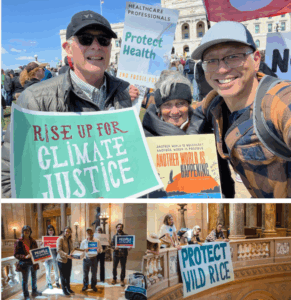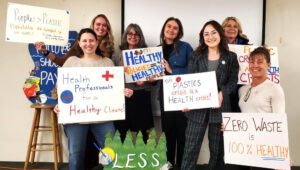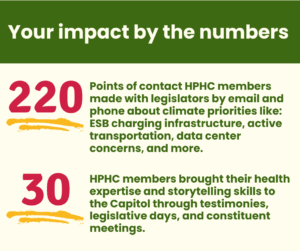 By Kathleen Schuler, MPH
By Kathleen Schuler, MPHState Policy Director, HPHC
5 min. read
While much was left undone on May 19, the last official day of the 2025 legislative session, legislators completed the state’s business via a brief special session on June 9. Our legislators worked together across the aisle to keep the state working for all Minnesotans by passing a $66 billion state budget for the 2026-2027 biennium.
Like many in our Minnesota community, we are processing the political violence and deaths of State Representative Melissa Hortman and her husband, Mark Hortman, along with targeted attacks upon other state legislators, including State Senator John Hoffman and his wife, Yvette Hoffman, and their family. Rep. Hortman was a dedicated and skilled leader who supported policies that strengthened public health and protected the health of our climate. You can read HPHC’s full reflections here.
While these times are extremely difficult, we know the path forward is one where we grieve fully, love one another deeply, and hold on to our shared humanity.
Health and climate advocates came together to defend Minnesota’s climate progress.
Though there was less progress on health-protective climate policies than we would have liked, HPHC joined partner groups to collectively push back on several policies that would have taken Minnesota in the wrong direction.
Proposals for carve-outs of the 100% carbon free energy law showed up in the Senate Omnibus Energy bill, but were ultimately rejected. These included proposals to allow B100 biodeisel and burning woody biomass to get credit as 100% carbon-free, as well as allowing large hydroelectric projects to be included.
In addition, most cuts to public and active transportation were avoided for this biennium by shuffling around funding sources. The legislature also rejected a proposal to delay the Minnesota Department of Transportation’s Climate Impacts of Highways initiative. That initiative requires the agency to consider greenhouse gas emissions and vehicle miles traveled reductions when they review highway proposals. Finally, though a proposal to sunset Minnesota’s Community Solar Garden program was proposed, the program survived and will continue to add public health benefits by reducing harmful pollutants.

Image credits: Dan Trajano (top). Devon Young Cupery (bottom images).
Subsidies for mega data centers were a major focus this legislative session — and we brought an evidence-based health perspective to the discussion.
HPHC raised health concerns in a letter to legislative leaders about the impacts on environment and health of the ten massive data centers proposed for Minnesota.
We’re concerned about excessive electricity and water use, as well as increased air pollution and generation of massive amounts of electronic waste that will impact public health. The legislature ultimately passed a bill that extends certain tax breaks for data centers up to 2042.
However, the bill does include some guardrails. Data centers must pay a fee (ranging from $2 million to $5 million) that will go to the Minnesota Department of Commerce weatherization account to benefit low-income consumers. The bill also includes some protections for water use and requires that data centers pay workers a prevailing wage. In the end, the bill appears to be a win for data centers, rather than for public health. This is an emerging topic, and HPHC will continue to work with partners to bring an evidence-based health perspective as big tech continues to hone in on Minnesota.
Electric school buses and vehicles were also a focus, with mixed results.
🚌 Electric school bus (ESB) charging infrastructure bill: HPHC and the Coalition for Clean Transportation advocated for $1 million in bonding money to help school districts fund electric school bus charging infrastructure. While the legislature passed a $700 million bonding bill, our request was not included. We learned that our request, because it is classified as “appropriation bonding,” must be approved by the Energy Committees in each body before being considered by the Capital Investment Committees. Now that we know the process, we are hopeful that our request will be approved in the 2026 session. Stay tuned for ways to plug in to advancing this forward next year.
⚡Electric vehicle (EV) surcharge increased: Currently, EV owners pay an added surcharge of $75 when they register their vehicle annually. This fee supports upkeep of road infrastructure that comes from the gas tax, which is paid by drivers of internal combustion engine vehicles. There was a proposal to raise the surcharge to $225. Because the higher fee would put a burden on lower to middle income EV owners and disincentivize future EV purchases, clean transportation advocates proposed a value-based fee which was ultimately adopted. The base surcharge will increase to $150, but more expensive vehicles will have a proportionally higher fee. There will be a new fee of $.05 per kilowatt hour at public charging stations effective July 2027, but the surcharge minimum will drop to $100.
Event though health professionals had impact, the following bills will have to wait until 2026.
🏭 Amortization bill: This did not receive a hearing, but would have allowed local government rezoning to phase out polluting businesses, particularly in communities harmed by redlining and environmental injustices.
♻️ Electronic Waste Stewardship bill: Several HPHC members and staff attended the MN Zero Waste Coalition’s legislative day, which heavily focused on the recycling electronic waste bill.
🥣 Phthalate Testing in Packaged Food bill: HPHC member and Climate and Healthy Equity Leaders fellowship alum, Hannah Resendiz Olson, MPH brought her public health voice to the discussion on phthalates alongside the Coalition for Plastics Reduction. As Hannah shared in her legislative testimony, “Minnesotans deserve to know what’s in our food. There’s no safe level of plasticizers, yet we are unknowingly and frequently exposed to them.”

Several members of HPHC hold signs in support of zero waste policies that improve health while at the MN Zero Waste Coalition’s legislative day.
While the legislative session ended, we know the work to address the climate crisis from a health perspective is a year-round endeavor.
Thank you for participating in our action alerts, joining a legislative event, or simply learning more about a proposed bill and asking good questions. Collectively, health professionals in HPHC’s network participated in the legislative session in 250 different ways.
We’re also grateful to many of HPHC’s Climate and Health Equity Leaders Fellows and program mentors who provided compelling testimony or attended committee meetings to bring more health voices to the rooms where decisions were made.

Health professionals within HPHC’s network participated in the legislative session in 250 different ways.
Interested in participating in HPHC’s policy advocacy?
Join an upcoming Policy and Advocacy Committee meeting.
The committee typically meets online from 6:00-7:30 p.m. on the third Tuesday of each month.
